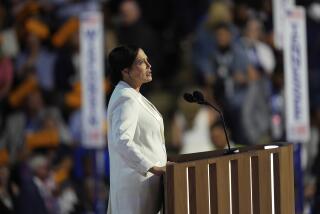Killing of Biko Unintended, Ex-Policemen’s Lawyer Says
Four former security policemen claim that they did not intend to kill anti-apartheid leader Steven Biko when they beat him in an interrogation two decades ago, their lawyer said Wednesday.
The four retired officers, plus a fifth who intends to confess, hope to win political amnesty from South Africa’s Truth and Reconciliation Commission in exchange for full confessions of their roles in one of the country’s most infamous abuses under apartheid.
Attorney Francois Jacobus van der Merwe said the officers were seeking immunity on charges of assault and culpable homicide for the death in police custody of the charismatic black activist on Sept. 12, 1977.
“I would describe it as an interrogation gone wrong,” Van der Merwe said. He added: “You could call it an accident.”
But attorney George Bizos, who helped represent the Biko family at a government inquest after the death, disputed that version of events.
“It’s not much different to the very fanciful account they gave at the inquest which was so far fetched that no reasonable man could believe them, except of course the magistrate in charge,” Bizos said. “I don’t know why they bothered.”
Biko’s death in police hands galvanized the nation and the world.
The eloquent advocate of black self-pride had emerged as leader of a generation of young black militants. His death made him a martyr of the cruelties of minority white rule and racial separation.
Biko’s legacy today includes Cabinet ministers, provincial premiers, church leaders, labor officials and others who came of age politically in Biko’s Black Consciousness Movement. Most of them later shifted allegiance to the more inclusive, nonracial philosophy of Nelson Mandela’s African National Congress.
Mandela, now president, created the truth commission last year to expose the past in hopes of healing the nation’s wounds. Van der Merwe said the former officers called him last year “in the spirit of reconciliation” and not because they feared prosecution.
The four officers applied for amnesty in December after the commission agreed to admit them to a special witness protection program, he said. Amnesty applications are not made public.
“I’m happy to say they’re not beating their chests and saying, ‘I’m proud of what I did,’ ” Van der Merwe said. “But you must remember that in the era this took place, [Biko] was an enemy of the government of the day. . . . At the time, they were fully convinced they were performing their duties within the law.”
A three-week inquest after Biko’s death took testimony from the five officers and others who questioned or saw the 30-year-old black activist leader during the 26 days he was detained after his arrest at a roadblock outside Port Elizabeth.
Police testified that Biko, who was stripped naked and in handcuffs, had attacked them in a fury during an interrogation session. They said he fell during what they called a “scuffle” and hit his head on a wall.
Two government doctors who examined Biko the next day found him frothing at the mouth, hyperventilating and unable to speak or stand. But they pronounced him fit for travel.
Nearly comatose, Biko was dumped naked on the floor of a police vehicle for the 700-mile drive to Pretoria Central Prison. The officer who accompanied him, then-Capt. Daantjie Siebert, told the prison warden that Biko had studied medicine and yoga and was probably faking his injuries.
Biko died on the stone floor of his cell the next day of severe head trauma and brain damage.
The leader of the interrogation team, then-Maj. Harold Snyman, told the inquest that Biko was “never assaulted by anyone.” Asked how he felt about his death, Snyman replied: “I felt bad about it. He was worth more to us alive than dead.”
The magistrate in charge of the inquiry ruled that neither the police nor the doctors--who now will face truth commission scrutiny--could be held criminally liable for Biko’s death. Nearly all the police in the case were later promoted.
Snyman, Siebert, retired Lt. Col. Gideon Nieuwoudt and then-Warrant Officer Ruben Marx already have applied for amnesty, their lawyer said, although the application papers may be revised. The lawyer said the fifth member of the interrogation team, Warrant Officer Johan Beneke, will apply too.
John Allen, spokesman for the truth commission, said public hearings are not likely for several months because of a backlog of amnesty cases. Convicts who have applied for pardons are being given priority, he said.
Allen called the confessions a major breakthrough for the commission, which has faced growing criticism for failing to induce former officials and security agents to publicly admit the crimes they committed in the name of white rule.
Biko’s widow, Ntsiki Biko, a nurse at the hospital in rural King William’s Town, declined comment on the case until she and other family members could meet.
In the past, the family has opposed granting amnesty, demanding that offenders be prosecuted instead.
More to Read
Sign up for Essential California
The most important California stories and recommendations in your inbox every morning.
You may occasionally receive promotional content from the Los Angeles Times.







